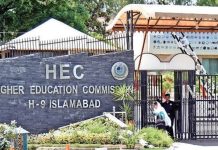By Hina Kiyani
ISLAMABAD: Convener National Taskforce on Sustainable Development Goals (SDGs) Romina Khurshid Alam on Wednesday said the country was demanding the developed countries to provide compensation and not aid for the climate devastation occurred due to their greenhouse gas emissions damaging the nature.
Addressing the opening session of the two-day media training workshop on “Climate Extremes with Emphasison Health Impacts” organised by the Global Change Impact Studies Centre (GCISC) in collaboration with the NIH, PAMI and Environmental Journalists Association (EJA), she said this was a high time to raise voice using the platform of media on climate change and get climate justice.
She told the participants that the third regional Inter-Parliamentary Union (IPU) Asia Pacific Region Conference seminar was held in the Parliament where delegates from different countries were informed that Pakistan was suffering from the developed countries’ irresponsible and nature damaging advancement. “Climate action is now or never. If we are not going to make the developed countries realise the damages they incur on nature causing climate change then the destruction due to global warming is unimaginable. Revolutions come because of people and when they are impacted due to climate change it will be unprecedented. “Our taskforce on SDGs is making efforts and people should visit it’s website and give their suggestions and recommendations to achieve SDGs and the shared goal of nature conservation,” she ended.
Arif Goher, Head of Agriculture and Coordination Sections GCISC, while providing an overview of the event said the GCISC, in collaboration with regional partners, was working on a project titled “Towards Robust Projections of Climatic Extremes and Adaptation Plans over South Asia” which was funded by the Asia Pacific Network for Global Change Research (APN), Japan.
Besides Pakistan, the project involved Bangladesh, China, Nepal, the United States, Japan, Brazil, and Korea who provide technical expertise and data.
He said the main aim of this project was to create high-resolution regional and local future climate extremes data for impact, adaptation, and vulnerability studies in South Asian countries, as well as to equip students with the necessary training. “Under this project, one part is to provide a platform for sharing knowledge and capacity building of students and scientists over extreme events and their impacts.”
The scientific findings on climate extremes would be communicated to policymakers, government organizations, media, the public, and various stakeholders through reports, presentations, workshops, and media training, he added.
In this context, the GCISC intended to hold a Media Training Workshop titled “Climate Extremes with Emphasis on Health Impacts” with the aim to minimize the gap between climate change, health, and media professionals and bring them on one platform to understand their limitations and technicalities by exchanging experiences and capacity building, he added.
He said the increasing temperatures, changing weather patterns and event were rapidly increasing in the world and Pakistan could not be secluded from it. “GCISC is mandated for national level policy making, research and analysis to guide policy makers for future predictions. The researches are available but the communication gap can lead to incorrect rather inaction in case of addressing environmental degradation. However, it needs to be simple and clear climate communication. The workshop aim is to bring all stakeholders together to achieve the objective as over 20 national and international speakers will impart lectures during the workshop.”
Guest of Honour General Secretary PAMI, Dr Riaz Shahbaz Janjua said climate change had a direct link to health impacts as infant mortality rate was very high in Pakistan as the climate affect was contributing in our infant, maternal and general mortality rate. He said the country could save a lot of money, physical and social torture after addressing the health impacts of climate change.
Senior Journalist and Chief Executive Officer (CEO) Media Communications, Muhammad Khalid Jamil also delivered his welcome remarks and later co-chaired the technical session of the first day.
APN-Project Lead and Senior Scientific Officer, Dr Shaukat Ali presented a brief project overview and research progress.
During the first technical session, the experts discussed various multifaceted issues and discussed communication strategies and role of media in reporting climate change.
President EJA Abid Ali Azmi delivered a detailed presentation of climate change health impacts on electronic media. The students of environmental sciences departments of the leading varsities of the twin cities of Rawalpindi and Islamabad including media persons, experts and academia participated in the workshop.



